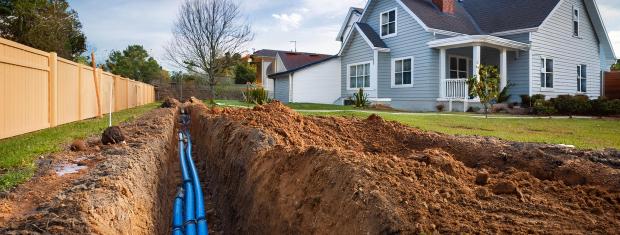
The Hidden Dangers: Risks of Buried Utility Lines Bursting for Homeowners
Homeownership comes with many responsibilities, and while most are visible and manageable, some lie hidden beneath the surface, quite literally. Buried utility lines, which include water and gas lines are essential for modern living but can pose significant risks if they burst.
This blog entry aims to review the potential dangers these underground utilities can present and offer some insights on how homeowners can mitigate these risks.
Understanding Buried Utility Lines
Buried utility lines are conduits that deliver essential services to your home. Water lines supply clean water, gas lines provide fuel for heating and cooking, and sewer lines remove wastewater. These lines are typically buried underground to protect them from the elements and reduce the risk of damage from external factors. However, despite these precautions, several issues can lead to their failure.
Common Causes of Buried Utility Line Bursts
Several factors can contribute to the bursting of buried utility lines:
- Age and Wear: Over time, utility lines can deteriorate due to wear and tear, leading to weaknesses in the structure that can cause bursts.
- Ground Movement: Natural events such as earthquakes, soil erosion, and even heavy traffic on the surface can cause the ground to shift, putting stress on the utility lines and potentially causing them to rupture.
- Tree Roots: Roots from large trees can grow into and around utility lines, exerting pressure and eventually causing breaks or blockages.
- Construction Activities: Excavation and construction activities near your property can inadvertently damage utility lines, especially if their locations are not accurately mapped.
- Improper Installation of Materials: Poor installation practices or the use of substandard materials can result in premature failure of utility lines.
Potential Risks and Consequences
The bursting of buried utility lines can have severe and costly consequences for homeowners. Here are some of the primary risks associated with these incidents:
Water Line Bursts
Water line bursts can lead to significant property damage. Water can seep into foundations, walls, and basements, causing structural damage and fostering mold growth, which can pose health risks. Additionally, a burst water line can result in a sudden loss of water supply, disrupting daily activities and necessitating expensive repairs and water damage restoration.
Gas Line Bursts
A burst gas line is a critical emergency. Gas leaks can lead to explosions and fires, posing a severe threat to the safety of the occupants and the property. Gas leaks can also cause health issues, including nausea, headaches, and respiratory problems.
In the event of a gas line burst, immediate evacuation and emergency services intervention are necessary.
Preventive Measures for Homeowners
While some causes of utility line bursts are beyond the control of homeowners, there are several proactive steps you can take to minimize the risks:
Regular Inspections and Maintenance
Regular inspections by qualified professionals can help identify potential issues before they become major problems. Routine maintenance can extend the life of utility lines and ensure they remain in good condition.
Know the Location of Your Utility Lines
Before undertaking any landscaping or construction projects, it's essential to know the exact location of your buried utility lines. Contact your local utility companies to get maps and mark the locations to avoid accidental damage.
Plant Trees Away from Utility Lines
When planting trees, ensure they are located away from utility lines. Choose tree species with less aggressive root systems to minimize the risk of roots interfering with the buried lines.
Monitor for Signs of Trouble
Be vigilant for signs that might indicate a problem with your utility lines. Unexplained wet spots in your yard, a sudden drop in water pressure, unusual smells, or gurgling sounds from drains can all be early warning signs of an issue.
Emergency Preparedness
Despite best efforts, emergencies can still occur. Having a plan in place can make a significant difference in how you handle a utility line burst:
Know How to Shut Off Utilities
Ensure you know how to shut off the main water and gas supplies to your home. This knowledge can prevent further damage in the event of a burst.
Keep Emergency Numbers Handy
Have a list of emergency contacts, including local utility companies, plumbers, and emergency services readily available. Quick access to these numbers can expedite the response time and minimize damage.
Insurance Considerations
As many towns have aging underground utility systems, insurance coverage for buried utility lines is increasingly needed and significant. *Rockford Mutual has a Buried Utility Lines coverage endorsement that can provide up to $10,000 of coverage for damaged buried utility lines on the residence due to a disruption that requires repair. This can include other costs like excavation, expediting, upgrade to new materials and additional living expenses.
Review your homeowner's insurance policy to understand what coverage you have for utility line bursts, and don’t hesitate to contact your local independent insurance agent with any questions.
The risks associated with buried utility lines bursting are significant, but with proper knowledge and preventive measures, homeowners can mitigate these dangers. By taking proactive measures today, you can safeguard your property and ensure peace of mind for years to come.
*The information contained in this entry is designed for informational purposes only and in no way alters, modifies, or extends the terms, coverages, conditions, and exclusions contained in your policy. Please refer to your policy for specific details.


